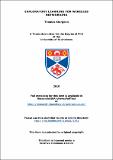Exploratory learning for wireless networking
Abstract
This dissertation highlights the importance of computer networking education and the challenges in
engaging and educating students. An exploratory learning approach is discussed with reference to
other learning models and taxonomies. It is felt that an exploratory learning approach to wireless
networks improves student engagement and perceived educational value.
In order to support exploratory learning and improve the effectiveness of computer networking
education the WiFi Virtual Laboratory (WiFiVL) has been developed. This framework enables
students to access a powerful network simulator without the barrier of learning a specialised systems
programming language. The WiFiVL has been designed to provide “anytime anywhere” access to a
self-paced or guided exploratory learning environment.
The initial framework was designed to enable users to access a network simulator using an HTML
form embedded in a web page. Users could construct a scenario wherein multiple wireless nodes were
situated. Traffic links between the nodes were also specified using the form interface. The scenario is
then translated into a portable format, a URL, and simulated using the WiFiVL framework detailed in
this dissertation. The resulting simulation is played back to the user on a web page, via a Flash
animation.
This initial approach was extended to exploit the greater potential for interaction afforded by a Rich
Internet Application (RIA), referred to as WiFiVL II.
The dissertation also details the expansion of WiFiVL into the realm of 3-dimensional, immersive,
virtual worlds. It is shown how these virtual worlds can be exploited to create an engaging and
educational virtual laboratory for wireless networks. Throughout each development the supporting
framework has been re-used and has proved capable of supporting multiple interfaces and views.
Each of the implementations described in this dissertation has been evaluated with learners in
undergraduate and postgraduate degrees at the University of St Andrews. The results validate the
efficacy of a virtual laboratory approach for supporting exploratory learning for wireless networks.
Type
Thesis, PhD Doctor of Philosophy
Rights
Creative Commons Attribution-NonCommercial-ShareAlike 3.0 Unported
http://creativecommons.org/licenses/by-nc-sa/3.0/
Collections
Except where otherwise noted within the work, this item's licence for re-use is described as Creative Commons Attribution-NonCommercial-ShareAlike 3.0 Unported
Items in the St Andrews Research Repository are protected by copyright, with all rights reserved, unless otherwise indicated.


